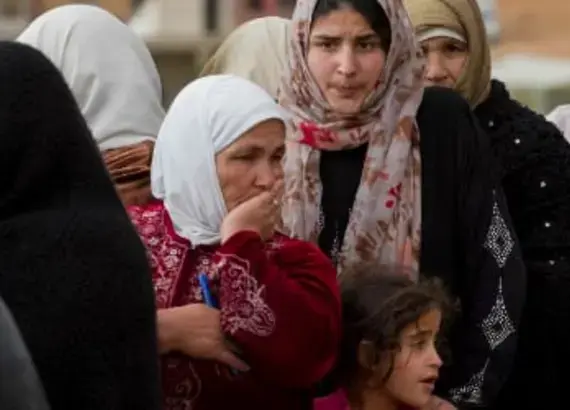
Success Story
Making Cracks in the Wall of Silence: Supporting Victims of Sexual Violence in Syria
Widespread sexual violence has characterized the conflict in Syria since its inception. The threat of rape, sexual slavery, and forced marriage impacts every aspect of the lives of Syrian women and girls, and such violence has continually worsened as the country’s civil war heads into its sixth year.
In order to better understand the challenges that women face as a result of the current conflict in Syria, raise awareness of sexual violence, and brainstorm solutions to address the issue at the local level, NDI-trained activists led discussions inside Syria on the topic of sexual violence. Three local partner organizations trained and deployed facilitators across the country, engaging over 1,000 activists in the discussions since the program began in June.
On January 28, as the culminating event of the program, representatives from NDI’s local partner organizations, civil society, women's networks and high-level political opposition figures gathered in Gaziantep, Turkey to discuss potential policy solutions to sexual violence in Syria. At the forum, civil society representatives shared the recommendations developed during the in-country discussions with government representatives and political stakeholders.
“Sexual violence is a real problem anywhere, but in Syria the matter is further complicated by the fear of continuous shelling, the risk of detention and the utter lack of timely and safe assistance - including health services, psychosocial, legal support services - in liberated areas,” said a civil society leader in attendance.
Victims of sexual violence also face intense stigma, as cultural norms prevent women and victims from speaking out about their experiences and becoming active participants in addressing the issue within their communities. Compounding the problem, as observed in a March 2015 United Nations report on the conflict, is a lack of reliable data on conflict-related sexual violence “owing to prevailing insecurity...the lack of specialized, safe and confidential services and challenges in accessing services where they are available.”
At the end of this day-long forum, key participants representing decision-making bodies and civil society signed a Declaration on Ending Sexual Violence Against Women and Girls in Syria. The Declaration acknowledges “the grave impact” of sexual violence inside Syria and emphasizes “the need for survivors of sexual violence to be supported and not stigmatized to prevent their further harm and suffering.” The forum sets local leadership down a new path where sexual violence in Syria will not be tolerated.
“We can ensure this Declaration makes a difference in the lives of Syrian women and girls by addressing impunity, setting up services for survivors and raising awareness,” said Elvis Zutic of NDI. “Further, this activity sets a valuable precedent for establishing democratic practices at the local level, and for involving women in policy debates and decision-making processes.”
In an address to the forum via video message, the British Prime Minister’s Special Representative on Preventing Sexual Violence in Conflict, Baroness Anelay, reminded participants of the importance of their continued commitment to making incremental change to stop sexual violence. “Women and girls are at extreme risk across the country,” she said, but “police officers, council members and activists are making cracks in the wall of silence.”
 Devastation in the city of Homs, Syria.
Devastation in the city of Homs, Syria.Participants included Mohammed Sarmini (Advisor to the Syrian Interim Government Prime Minister), Samah Hadaya (Syrian Interim Government Minister of Culture and Social Affairs), Mohamed Mactabi (Syrian Opposition Coalition Secretary General), city, local and provincial council members, police representatives, Colin Smith (Foreign and Commonwealth Office, Head of Syria Office, Istanbul) and Elvis Zutic (NDI Senior Resident Representative).
This program is supported by the British Foreign & Commonwealth Office's Magna Carta Fund for Human Rights and Democracy.
Published on February 5, 2016.



